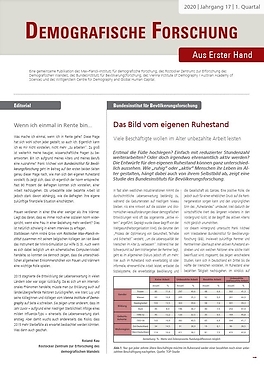March 24, 2020 | Defo News
Many workers want to perform unpaid work in old age

© MPIDR
The new issue (No. 1/2020) of Demografische Forschung Aus Erster Hand, the popular science newsletter with latest research results from demography, has been released.
The Newsletter is available in German only.
"Demografische Forschung Aus Erster Hand" is a joint publication of the Max Planck Institute for demographic Research (MPIDR), the Rostocker Zentrum zur Erforschung des Demografischen Wandels (RZ), the Vienna Institute of Demography (VID), the Wittgenstein Centre for Demography and Global Human Capital and the Federal Institute for Population Research (BiB).
The topics of the new issue are:
1. How people picture their retirement
Many workers want to perform unpaid work in old age
(from the Federal Institute for Population Research)
Should you put up your feet? Simply continue working, but at reduced hours? Or stay active by volunteering somewhere? People’s plans for their retirement can vary considerably. Whether people lead an “active” or a “quiet” life in old age depends to a large extent on their own self-image, a study by the Federal Institute for Population Research shows.
2. The gender cliff
Why women in a partnership seldom earn more than men
(from the Max Planck Institute for Demographic Research)
In many European countries, most women earn no more than half of the household income. This seems to indicate that the belief that the man should bring home the lion’s share of the family income still prevails. However, a new study by the Max Planck Institute for Demographic Research shows that there may be other reasons why a man generally earns more than his partner.
3. False alarm
Why the decline in life expectancy in 2015 is not a cause for concern
(from the Vienna Institute of Demography)
When life expectancy figures are published, they usually reflect so-called “period life expectancy” (PLE). They are calculated based on the age-specific mortality rates of the current year, and can be seen as indicators of the health development of a country. But in reality, there are effects that can distort these numbers, as a recent study by the Vienna Institute of Demography demonstrates.
The newsletter is released four times a year and is available electronically and as a printed version and is free of charge.
All past issues are available online on the Newsletter website. On the website you also have the possibility to subscribe to the Newsletter to get informed about the release of the new issues or to receive the printed versions by mail.